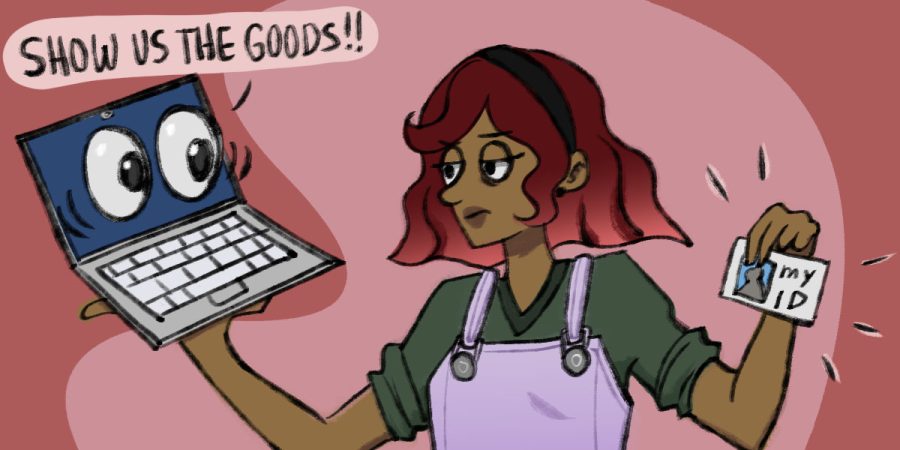Online proctoring is terrible for education
November 23, 2022
Online proctoring is entirely invasive. Companies such as Honorlock and Proctorio need specific information such as what your room looks like or all the information from a government-issued ID when a school ID should do the trick. This is a complete violation of privacy.
Proctoring services in which users have to download something that scans their computer should be illegal. After trying to download the proctoring software Honorlock, the antivirus program I had on my computer would not let me download. The antivirus program warned me that Honorlock could potentially scan documents on my computer. I was only able to download Honorlock after disabling the antivirus program.
I have autofill information on my computer that contains my mobile device and financial information. It is truly terrifying to think Honorlock might have scanned my autofill information after removing the antivirus program.
I understand online proctoring is meant to prevent cheating and plagiarism. These are issues facing college campuses and schools across the U.S. especially due to the COVID-19 pandemic, which forced many classes to go online.
Having a locked down browser so you are not allowed to leave a quiz or exam screen is fine, but when my computer, my room and my personal ID, which has my home address are getting scanned, I get suspicious and mistrustful.
As a college student, when this software is required for taking important exams, I am left feeling doubtful about certain schools and universities and how they treat students.
The ability to track movements is a big problem. This is particularly hard for students with ADHD. This is not ideal when you are taking a longer test, such as a midterm or a final exam, and you have to take tests lasting upwards of 120 minutes. These proctoring services want you to look at your screen for that long without moving your head or body.
Schools and universities are allowing companies to track your movements while also tracking your data. This is a complete invasion of privacy, and schools that use these services allow it to happen.
According to The Washington Post, Aaron Ogletree, a Cleveland State University student, alleged the university violated the Fourth Amendment when he was trying to take a test and he was asked to allow remote proctoring to scan his surroundings in search of “potential impermissible study aids or notes.”
When the request came up before his test, Ogletree had confidential tax information in view and there was no time to shield his information. The scan was recorded, a copy was kept by the proctoring company and the scan was also available to his fellow students. Ogletree argued this violated his Fourth Amendment right to be free of unreasonable search and seizure.
The Ohio federal judge presiding over his case agreed. Judge J. Philip Calabrese said: “The ubiquity of a particular technology or its applications does not directly bear on that analysis.
In the court’s view, the very core of the Fourth Amendment is the right to be free of governmental intrusion in the home; the proctoring scan occurred in the Plaintiff’s house, in his bedroom.”
Ogletree’s case is an example of what students go through. There is no consideration for students, no thought process for what students might be going through and no sense of urgency for changing these proctoring services and coming up with different viable solutions.
This issue is not going to stop. According to The Washington Post, “The global market for examination proctoring software is expected to reach $1.5 billion by 2028.” These businesses want you to believe they somehow “protect academic integrity.”
Make no mistake: The companies offering online proctoring services are doing it for profit. They have no thoughts or feelings about students, even if they are cheating. Their thoughts are on the money.
Students across Texas are taking notice of what these proctoring services are doing. The University of Texas at Dallas has a petition to remove Honorlock with over 7,000 signatures. Texas A&M has a similar petition with almost 10,000 signatures. Texas Tech University has a petition to ban Proctorio with over 2,000 signatures. Petitions can only do so much, but it shows that students across Texas are seeing what these services are doing and want to put a stop to harmful online proctoring.
It is truly egregious that online proctoring is still allowed at certain schools and universities. Schools should protect students from things such as this, not allow it to happen. A federal judge ruled that online proctoring is unconstitutional. That should be enough to ban all online proctoring.
The very idea of a service looking at my personal information and my own home is truly terrifying as a college student. It is dystopian, and should never be allowed on any type of campus.


